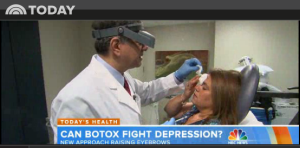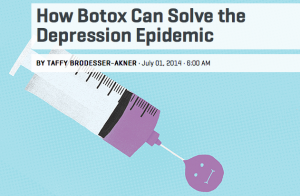While Botox is commonly used for cosmetic purposes, doctors say the reasoning behind the treatment for depression may not be what you expect.
“We don’t believe it has anything to do with looks,” says researcher Dr. Eric Finzi of Chevy Chase Cosmetic Center.
Rather, he says it’s because facial expressions are part of the circuit of the brain related to mood.
 Dr. Eric Finzi will be a guest on NPR Boston’s The Colin McEnroe Radio Show today at approximately 1:06PM EST talking about the Botox for Depression research study findings published in the Journal of Psychiatric Research (May 2014). The study “Treatment of Depression with onabotulinumtoxinA: A Randomized Double-Blind, Placebo Controlled Trial” found that 52% of subjects suffering from moderate to severe depression showed a relief from depression after injection of botulinum toxin to the glabellar area between the eyes, compared with only 15% of those who received the saline placebo. A second phase to this study is in the works.
Dr. Eric Finzi will be a guest on NPR Boston’s The Colin McEnroe Radio Show today at approximately 1:06PM EST talking about the Botox for Depression research study findings published in the Journal of Psychiatric Research (May 2014). The study “Treatment of Depression with onabotulinumtoxinA: A Randomized Double-Blind, Placebo Controlled Trial” found that 52% of subjects suffering from moderate to severe depression showed a relief from depression after injection of botulinum toxin to the glabellar area between the eyes, compared with only 15% of those who received the saline placebo. A second phase to this study is in the works.

 Is botulinum toxin a viable treatment option for major depressive disorder?
Is botulinum toxin a viable treatment option for major depressive disorder? In the largest study to date on the effect of botulinum toxin on depression, researchers Eric Finzi, MD, PhD, and Norman E. Rosenthal, MD, found that 52% of subjects suffering from moderate to severe depression showed relief from depression after injection of botulinum toxin to the glabellar area between the eyes, compared with only 15% of those who received the saline placebo. The study, “Treatment of depression with onabotulinumtoxinA: A randomized, double-blind, placebo controlled trial” was published in Journal of Psychiatric Research, Volume 52 (May 2014). These findings help to confirm a novel concept for mental health – using facial expressions to influence thoughts and feelings.
In the largest study to date on the effect of botulinum toxin on depression, researchers Eric Finzi, MD, PhD, and Norman E. Rosenthal, MD, found that 52% of subjects suffering from moderate to severe depression showed relief from depression after injection of botulinum toxin to the glabellar area between the eyes, compared with only 15% of those who received the saline placebo. The study, “Treatment of depression with onabotulinumtoxinA: A randomized, double-blind, placebo controlled trial” was published in Journal of Psychiatric Research, Volume 52 (May 2014). These findings help to confirm a novel concept for mental health – using facial expressions to influence thoughts and feelings. 